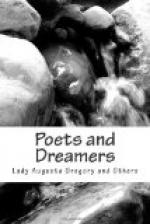When at the beginning of the seventeenth century, the poets O’Lewy and O’Clery and their supporters held a ‘Contention,’ the results were written down in a volume containing 7,000 lines. I think the greater number of the ‘Contentions’ between Raftery and his fellow-poets were never written down; but the country people still discuss them with all the eagerness of partisans. On old man from Athenry says: ’Raftery travelled Ireland, challenging all the poets of that time. There were hundreds of country poets in those days, and a welcome for them all. Raftery had enough to do to beat them, but he was the best; his poetry was the gift of God, and his poems are sung as far away as Limerick and Dublin.’ There is a story of his knocking at a door one night, when he was looking for the house of a poet he had heard of and wanted to challenge, and saying: ‘I am a poet seeing shelter’; and a girl answered him from within with a verse, saying he must be a blind man to be out so late looking for shelter; and then he knew it was the house he was looking for. And it is said that the daughter of another poet was on his way to see in Clare, gave him such a sharp answer when he met her outside the house that he turned back and would not contend with her father at all. And he is said to have ’hunted another poet Daly—hunted him all through Ireland.’ But these other poets do not seem to have left a great name. There was a Connemara poet, Sweeny, that was put under a curse by the priests ‘because he used to make so much fun at the wakes’; and in one of Raftery’s poems he thanks Sweeny for having come to his help in some dispute; and there was ’one John Burke, who was a good poet, too; he and Raftery would meet at fairs and weddings, and be trying which would put down the other.’ I am told of an ‘attack’ they made on each other one day on the fair green of Cappaghtagle. Burke said: ’After all your walk of land and callows, Burke is before you at the fair of Cappagh.’ And Raftery said: ’You are not Burke but a breed of scatties, That’s all over the country gathering praties; When I’m at the table filling glasses, You are in the corner with your feet in the ashes.’ Then Burke said: ’Raftery a poet, and he with bracked (speckled) shins, And he playing music with catgut; Raftery the poet, and his back to the wall, And he playing music for empty pockets. There’s no one cares for his music at all, but he does be always craving money.’ For he was sometimes accused of love of money; ’he wouldn’t play for empty pockets, and he’d make the plate rattle at the end of a dance.’
But his most serious rival in his own part of the country was Callinan, the well-to-do farmer who lived near Craughwell, of whom the old women in the workhouse spoke. I have heard some of Callinan’s poems and songs; but I do not find the imaginative power of Raftery in them. He seems, in distinction to him, to be the poet of the domestic affections, of the settled classes. His songs have melody




